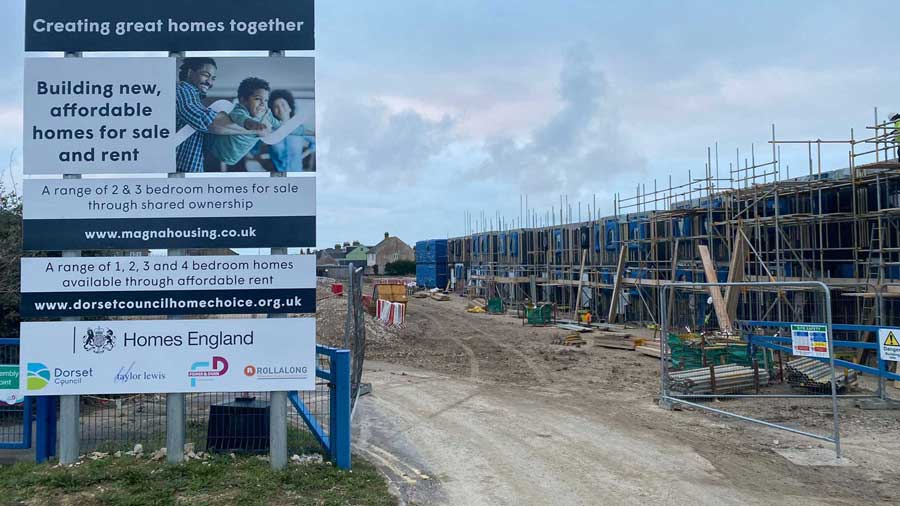Image: Istock
The supply chain dilemma
How can we hope to build new social homes and maintain and improve existing stock when we lack the professional workforce to do so?

GROWTH, REGENERATION & DEVELOPMENT

Elly Hoult
Chief Operating Officer, Peabody, and Vice-President, Chartered Institute of Housing

Elly Hoult
Chief Operating Officer, Peabody, and Vice-President, Chartered Institute of Housing
Issue 73 | September 2024
With one child in every class in London currently in temporary accommodation – basically homeless – the urgent and desperate need for more social housing is clear. But housing associations and councils are facing a raft of challenges and competing financial pressures.
It’s costing more to look after residents’ homes than ever before. The cost of building safety and sustainability has put pressure on resources and our capacity to invest. And the cost of borrowing and servicing the debt we’ve raised to deliver new social housing remains at elevated levels.
But we’re determined to get through these challenging circumstances. We’re talking with residents, to the sector, our partners and our stakeholders. We have a lot to achieve, and we need policy stability and support to build back our capacity to invest.
Skills for the future
Just as important, is the need for a strong, well-resourced and highly skilled supply chain. We won’t be able to tackle the housing emergency and help grow the economy without the professional workforce to make it happen.
That’s why the recently established London Homes Coalition is so vital. The group, a partnership of major housing associations, contractors and specialist providers, supported by the government and strategic stakeholders, has published a Building Skills for the Future report, which clearly shows the labour and skills shortage that threatens the provision, maintenance, retrofit and improvement of social and affordable housing in the capital.
According to the report, we need an additional 10,000 workers each year to maintain existing homes and as many as 31,000 workers over the next five years to get new homes built.
The report also warns of a potential deficit of around 2,600 skilled workers for the coalition alone, which makes up about 10 percent of London’s overall construction workforce.
additional workers needed each year to maintain existing homes
workers needed over the next five years to get new homes built
potential deficit of skilled workers for the coalition alone (around 10% of London's overall construction workforce)
The wider costs
The UK social housing sector is a cornerstone of the national economy, investing billions each year in improving and maintaining homes. Housing associations’ investment alone adds £11.8 billion to the national economy each year, creating substantial value for communities, supporting job creation, and driving economic growth.
Addressing the skills shortage could also save social care services more than £3.5 billion a year, while fixing the worst housing for low-income adults could save the NHS £600 million a year.
We need a plethora of trades, skills and specialisms. Supply chain expertise in specific safety-related improvements and low-carbon retrofit projects are in exceptionally high and growing demand.
Buildings are now the second-largest contributor to the UK’s emissions, according to the Climate Change Committee. And with the 2050 net zero target looming, additional expertise, technologies and funding are needed to make the required upgrades and improvements. The skills shortage is already holding us back.
“Addressing the skills shortage could also save social care services more than £3.5 billion a year, while fixing the worst housing for low-income adults could save the NHS £600 million a year.”
Long-term plan
So how do we attract, train and develop the people to be the skilled professionals our sector and our country need? We need a long-term plan, with organisations across the sector working together to bring about significant change. We need to promote the social housing sector nationally and showcase the opportunities and benefits of working in it. And we need to work closely with education providers to proactively reach young people and target under-represented groups.
Barriers to apprenticeships must be removed, and we need to develop healthy pipelines of work and certainty around funding so we can plan for the future, with long-term training programmes that add value to communities.
Partnerships will be key. In the past year alone, we’ve generated millions of pounds in social value with suppliers and contractors who share our purpose of helping people flourish. Whether they’re taking on apprentices, financing hardship funds, or supporting careers events for young people, everything we do in our supply chain helps scale up our positive impact for the long term.
Looking ahead, we need cross-sector, nationwide collaboration over the long term to establish a joined-up skills strategy – encompassing the whole supply chain and partnerships across the economy. We need to get working across industry, education and government to skill-up. This will support the businesses and professions we need to deliver for residents, drive good economic growth, and support everyone through good quality, sustainable and affordable homes.

“We need to work closely with education providers to proactively reach young people and target under-represented groups.”


